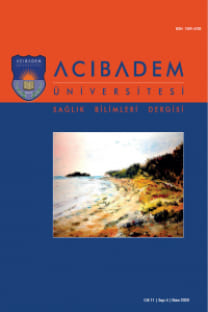Yetişkin Bireylerde Covid-19 Tükenmişliğinin Hedonik Açlık ile İlişkisinin Değerlendirilmesi
Evaluation of The Relationship Between COVID-19 Burnout and Hedonic Hunger in Adult Individuals
___
- 1. Akalın B and Modanlıoğlu A. Covid-19 Sürecinde Yoğun Bakımda Çalışan Sağlık Profesyonellerinin Duygu-Durum ve Tükenmişlik Düzeylerinin Değerlendirilmesi. Acıbadem Üniversitesi Sağlık Bilimleri Dergisi. 2021;12:346-52.
- 2. Arpacıoğlu S, Baltalı Z and Ünübol B. Burnout, fear of Covid, depression, occupational satisfaction levels and related factors in healthcare professionals in the COVID-19 pandemic. Cukurova Medical Journal. 2021;46:88-100.
- 3. The Lancet Editorial. Physician burnout: a global crisis. Lancet. 2019;394:93. DOI:10.1016/S0140-6736(19)31573-9
- 4. Kulualp HG. Tükenmişlik sendromu: kamu kuruluşu çalişanlari üzerine bir uygulama. Süleyman Demirel Üniversitesi Sosyal Bilimler Enstitüsü Dergisi. 2019;35:211-30.
- 5. Boggiano MM, Wenger LE, Turan B, et al. Real-time sampling of reasons for hedonic food consumption: further validation of the Palatable Eating Motives Scale. Frontiers in psychology. 2015;6(744):1-8.
- 6. Monteleone P, Scognamiglio P, Monteleone AM, et al. Gastroenteric hormone responses to hedonic eating in healthy humans. Psychoneuroendocrinology. 2013;38(8):1435-41. DOI:10.1016/j. psyneuen.2012.12.009
- 7. Ural A, Kılıç İ. Bilimsel Araştırma Süreci ve SPSS ile Veri Analizi Ankara: Detay Yayıncılık; 2021.
- 8. Malach-Pines A. The burnout measure, short version. International Journal of Stress Management. 2005;12(1):78-88.
- 9. Yildirim M and Solmaz F. COVID-19 burnout, COVID-19 stress and resilience: Initial psychometric properties of COVID-19 Burnout Scale. Death Stud. 2020:1-9. DOI:10.1080/07481187.2020.1818885
- 10. Cappelleri JC, Bushmakin AG, Gerber RA, et al. Evaluating the Power of Food Scale in obese subjects and a general sample of individuals: development and measurement properties. Int J Obes (Lond). 2009;33:913-22. DOI:10.1038/ijo.2009.107
- 11. Booth M. Assessment of physical activity: an international perspective. Res Q Exerc Sport. 2000;71(2):114-20.
- 12. Silva-Gomes RN and Silva-Gomes VT. COVID-19 pandemic: Burnout syndrome in healthcare professionals working in field hospitals in Brazil. Enferm Clin (Engl Ed). 2021;31:128-9. DOI:10.1016/j. enfcli.2020.10.011
- 13. Torrente M, Sousa PA, Sánchez-Ramos A, et al. To burn-out or not to burn-out: a cross-sectional study in healthcare professionals in Spain during COVID-19 pandemic. BMJ open. 2021;11(2):e044945. DOI: 10.1136/bmjopen-2020-044945
- 14. Jalili M, Niroomand M, Hadavand F, et al. Burnout among healthcare professionals during COVID-19 pandemic: a cross-sectional study. International Archives of Occupational and Environmental Health. 2021;94(6);1345-1352.
- 15. Matsuo T, Kobayashi D, Taki F, et al. Prevalence of Health Care Worker Burnout During the Coronavirus Disease 2019 (COVID-19) Pandemic in Japan. JAMA Netw Open. 2020;3(8):e2017271. DOI:10.1001/ jamanetworkopen.2020.17271
- 16. Arıkan G. COVID-19 Salgınında Stres: Olumsuz, Olumlu Sonuçları ve Önleyici Müdahalenin Olası Rolü. Psikiyatride Güncel Yaklaşımlar.2021;13:135-45.
- 17. Shuja KH, Aqeel M, Jaffar A, et al. COVID-19 Pandemic and Impending Global Mental Health Implications. Psychiatr Danub. 2020;32:32-5. DOI:10.24869/psyd.2020.32
- 18. Choi EPH, Hui BPH and Wan EYF. Depression and Anxiety in Hong Kong during COVID-19. Int J Environ Res Public Health. 2020;17:3740. DOI:10.3390/ijerph17103740
- 19. Firth J, Gangwisch JE, Borisini A, et al. Food and mood: how do diet and nutrition affect mental wellbeing? BMJ. 2020;369:2382. DOI: 10.1136/bmj.m2382.
- 20. Al-Musharaf S. Prevalence and predictors of emotional eating among healthy young Saudi women during the COVID-19 pandemic. Nutrients. 2020;12:2923.
- 21. Klatzkin RR, Gaffney S, Cyrus K, et al. Stress-induced eating in women with binge-eating disorder and obesity. Biol Psychol. 2018;131:96- 106. DOI:10.1016/j.biopsycho.2016.11.002
- 22. Andries AM. Positive and negative emotions within the organizational context. Global Journal of Human Social Sciences. 2011; 11:27-39.
- 23. Alammar WA, Albeesh FH and Khattab RY. Food and Mood: the Corresponsive Effect. Curr Nutr Rep. 2020;9:296-308. DOI:10.1007/ s13668-020-00331-3
- 24. Lowe MR and Butryn ML. Hedonic hunger: a new dimension of appetite? Physiol Behav. 2007;91:432-9. DOI:10.1016/j. physbeh.2007.04.006
- 25. Yu YH. Making sense of metabolic obesity and hedonic obesity. J Diabetes. 2017;9:656-66. DOI:10.1111/1753-0407.12529
- 26. Kutlutürk S and Yıkılmaz İ. Covid-19 Pandemisi Uzaktan Çalışma Sürecinde Akademisyenlerin İş Stresi, Tükenmişlik Algısı ve Kas İskelet Sistemi Ağrılarının İncelenmesi. Hacettepe University Faculty of Health Sciences Journal.2021;8:297-313.
- 27. Jiménez-Pavón D, Carbonell-Baeza A and Lavie CJ. Physical exercise as therapy to fight against the mental and physical consequences of COVID-19 quarantine: Special focus in older people. Progress in cardiovascular diseases. 2020;63:386-8. DOI: 10.1016/j. pcad.2020.03.009
- 28. Sonnentag S. Psychological detachment from work during leisure time: The benefits of mentally disengaging from work. Current Directions in Psychological Science. 2012;21:114-8.
- 29. Naczenski LM, De Vries JD, Van Hooff ML, et al. Systematic review of the association between physical activity and burnout. Journal of occupational health. 2017;59:477-94.
- 30. Dreher M, Dossereck N and Lachtermann E. [Physical activity and its effects on burnout syndrome - A systematic review]. Laryngorhinootologie. 2020;99:85-95. DOI:10.1055/a-1071-1905
- ISSN: 1309-470X
- Yayın Aralığı: 4
- Başlangıç: 2010
- Yayıncı: ACIBADEM MEHMET ALİ AYDINLAR ÜNİVERSİTESİ
Hasan KAYA, Aybeniz CİVAN KAHVE, Saniye Gökçe SAYKAL, Nihan BÜYÜKLÜOĞLU, Rabia Nazik YÜKSEL, Erol GÖKA
Osman Okan OLCAYSÜ, Buğra KARASU, Elif OLCAYSU, Atilla ÇAYIR, Ali Riza Cenk CELEBİ
Incidental Extrapulmonary Findings in Low-Dose CT of the Thorax
Zeynep Nilüfer TEKİN, Ali TÜRK, Suha ALZAFER, Zeynep BİLGİ, Tuna DEMİRBAŞ, Özlem BARUTCU
Kırılganlığın Serum D Vitamini Ve Paratiroid Hormon Düzeyleriyle İlişkisi
Şemsinnur Göçer, Özlem Balbaloğlu
Begüm Ünlü, Saadet Ufuk YURDALAN, İpek Özmen
Yetişkin Bireylerde Hedonik Açlığın Satın Alma Davranışı Üzerindeki Etkisinin Değerlendirilmesi
Nihan ÇAKIR BİÇER, İpek AKBURAK
İrem Kaya Cebioğlu, Sema Aydın, Harika Özkaya, Elif Günalan, Ece Özbekkangay, Binnur Okan Bakır
Nursel ÜSTÜNDAĞ ÖCAL, Sevda YAMAN, Mahmut KILIÇ, Güllü USLUKILIÇ, Şerife OK
